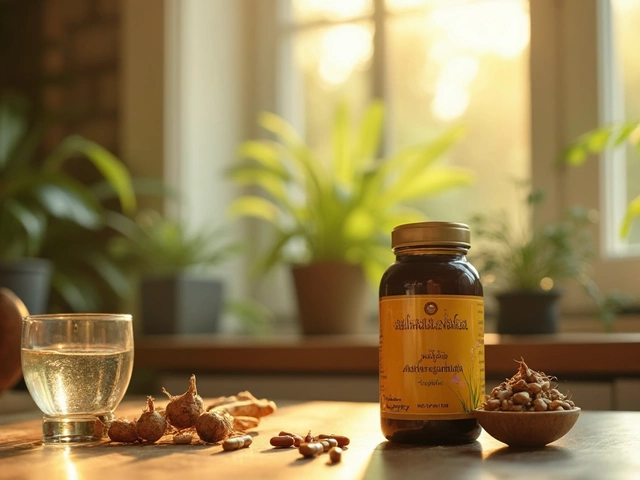In recent times, there's been a growing interest in herbal supplements as people seek more natural ways to enhance their health. Herbs, which have been harnessed for their healing properties for centuries, offer an alternative to conventional medicine. However, one of the most common questions people have is how long it takes for these herbs to start working in the body.
Herbal remedies can have varying onset times depending on several factors. The type of herb, how it's processed, personal body chemistry, and even lifestyle choices can influence how quickly or slowly you feel its effects. As we delve deeper into this topic, we'll explore these factors and provide guidance on how to best integrate herbs into your wellness routine.
- The Popularity of Herbal Supplements
- Factors Influencing Herb Effectiveness
- Common Herbs and Their Time to Work
- Forms of Herbs and Their Impact
- Tips for Optimal Usage
- Considerations and Precautions
The Popularity of Herbal Supplements
In an age where wellness and natural health choices are moving to the forefront, herbal supplements have seen a significant rise in popularity. This trend is largely driven by a growing desire among individuals to pursue a more holistic lifestyle, seeking alternatives to pharmaceutical drugs. People are increasingly aware of the potential side effects of synthetic medications, and this awareness has turned the spotlight back onto herbal supplements that many consider more gentle to the human system. The use of herbs isn't new. In fact, they have been an integral part of traditional medicine systems around the world, such as Ayurveda in India, Traditional Chinese Medicine, and Native American healing practices.
What makes herbal supplements particularly appealing is their accessibility and the broad spectrum of benefits they offer. From enhancing immune function to improving mental clarity and aiding digestion, each herb brings its unique properties to the table. For instance, ginseng is renowned for its ability to boost energy and concentration, while turmeric is celebrated for its anti-inflammatory properties. As consumers increasingly prioritize preventive healthcare, herbs provide an appealing solution without the need for prescriptions or frequent doctor visits. However, it's crucial to understand that not all herbal supplements are created equal, and their effectiveness can vary based on factors like quality, purity, and even the method of consumption.
Influenced by this growing movement, major healthcare brands and supermarkets have expanded their shelves to include a wide array of herbal products. This increased availability has naturally led to higher adoption rates among those seeking natural remedies. According to a survey conducted by the National Center for Complementary and Integrative Health, over 30% of adults in the United States used complementary health approaches like herbal supplements in 2023. This statistic reflects a significant shift in consumer habits, with people looking to take charge of their health in more natural ways. As Dr. Mehmet Oz once stated, "The body has an incredible capacity to heal itself, and sometimes all it requires is a little help from nature."
While the increasing popularity and adoption of herbal supplements are encouraging, it is essential for consumers to practice mindful consumption. This means being informed about the herbs they are taking, understanding potential interactions with other medications, and consulting healthcare providers, especially when dealing with chronic conditions. The journey into herbal supplementation should be navigated with care, appreciating the ancient wisdom while respecting modern scientific insights. As this field continues to grow, it offers not only promising paths to personal health improvement but also fosters a deeper connection to nature and history.
Factors Influencing Herb Effectiveness
Understanding how herbal supplements work in the body requires a deep dive into numerous factors that influence their effectiveness. Primarily, the type of herb being used plays a vital role in determining how quickly results manifest. Some herbs like peppermint for digestive issues or chamomile for relaxation can have rapid effects, often within hours. In contrast, others such as Echinacea for immune support or ginkgo biloba for cognitive benefits may take weeks to exhibit noticeable outcomes. It's essential to have some patience with these potent natural remedies.
Another crucial factor is the individual's unique body chemistry. Genetics, lifestyle choices, and even the presence of certain health conditions can alter how one metabolizes herbs. People react differently to the same herbal supplement, meaning that what works quickly for one person might take longer for another. This is akin to how some people feel the effects of caffeine more strongly than others, highlighting natural variability. Practitioners advise monitoring one’s response to herbal remedies carefully to better understand their personal interaction with the herbs.
The form in which the herb is consumed also plays a significant role. Fresh herbs might offer benefits faster due to their bioavailability, while dried forms, capsules, or teas could take a little longer as they need to be metabolized. Extracts and tinctures, being concentrated and in liquid form, are usually absorbed more swiftly than tablets. A practical tip is to ensure these forms are from reputable sources, as quality can greatly influence their efficiency.
Diet and nutrition are further contributors to how well herbs function within the body. A nutrient-rich diet can facilitate better absorption and faster results, as the body has the necessary resources to process these supplements. Sustaining a consistent intake of the herb according to the recommended dosage is crucial for optimal results. Missing doses or inconsistently using the herb can hinder its effectiveness and lead to a prolonged onset of beneficial effects. Ensuring integration into a daily routine thereby becomes vital.
"Herbs designed to improve bodily functions work best when combined with a balanced diet and proper lifestyle," says Dr. Jane Taylor, a renowned herbalist.
Finally, lifestyle factors such as stress levels, activity, and overall health status can impact how swiftly herbs take to work. Chronic stress or inadequate sleep might dampen the body's ability to utilize these natural remedies effectively. Therefore, recognizing one's holistic environment, beyond just the intake of herbs, is necessary for achieving desired outcomes from herbal supplementation.

Common Herbs and Their Time to Work
Herbal remedies have been the cornerstone of wellbeing long before modern medicine took center stage. As you explore the realm of herbal supplements, you might wonder how quickly they do their magic. Each herb operates differently within the body, with distinct onset times, primarily influenced by the herb's nature and the specific ailment it aims to tackle. Take Echinacea, known for its immune-boosting ability. When you use it at the very onset of a cold, it showcases its effects typically within a few days, strengthening your defense against invading germs by promoting white blood cell production. Then there's Valerian root, a favorite among those seeking herbal remedies for insomnia. It takes a bit longer, with noticeable sleep improvements often taking one or two weeks, as the compounds accumulate in the body over time.
Speedy Herbs: Quick to Act, Quick to Heal
Some herbs, like peppermint, are renowned for their relatively rapid effects. Often used to soothe digestive woes, peppermint capsule or tea can calm an upset stomach within minutes to hours post-consumption, thanks to its active compound menthol, known for relaxing the digestive tract muscles. Similarly, Ginger, long cherished for combating nausea, often works quickly, with many finding relief from travel sickness within an hour or so. However, it is crucial to consider that the body's response can vary based on one's personal physiology and the form in which these herbs are taken. For instance, fresh ginger or powdered versions might display quicker effects compared to heavier syrups or less concentrated pills.
Patience With Passion: Slow-Acting Herbs
On the other hand, some herbs demand a bit more patience. Turmeric is a vivid example; as a potent anti-inflammatory, many use it for joint aches and chronic pain. Yet, it often requires consistent daily use over several weeks to stir noticeable comfort. This delayed action is attributed to its active ingredient, curcumin, which, while powerful, needs time to accumulate and create impactful changes within the body. Be mindful, lasting relief often comes with steady commitment to these herbal remedies. As the age-old adage goes, 'Good things come to those who wait.' With patience, persistent use of turmeric can indeed reflect in increased mobility and reduced inflammation.
"Herbs work in harmony with the body over days and weeks rather than hours," notes Dr. Andrew Weil, a renowned integrative medicine expert.
The Formulation Factor: Extracts Versus Teas
Another dimension to consider with herbal remedies is the form in which they are taken. Herbal extracts and tinctures are often faster acting since they provide a concentrated dose of plant compounds that the body absorbs more efficiently. Comparatively, teas, while easier to ingest and gentler, may require regular intake to build up enough in the system to bring about their benefits. Chamomile tea, known for its calming properties, is a prime example. As a nightly ritual, its gentle, cumulative effects promote relaxation and ease over time, particularly beneficial in managing mild stress or anxiety. Whether you seek the convenience of pills, the ritual of teas, or the potency of tinctures, the choice is best made by weighing the onset time against your personal preferences and lifestyle.
Forms of Herbs and Their Impact
It's fascinating how the form in which herbal supplements are consumed can significantly affect their potency and the speed at which they take effect. The choice between teas, capsules, tinctures, or fresh herbs is not just a matter of convenience but also of bioavailability. Teas, for instance, tend to offer quick absorption since the active compounds are already in liquid form, allowing the body to process them more efficiently. This form is ideal for herbs like chamomile or peppermint, which are often sought for their calming properties.
Capsules, on the other hand, are preferred for their ease of use and precise dosing, particularly when dealing with herbs like turmeric or ginseng. Unlike teas, however, capsules might take a bit longer to show effects because they need to be broken down in the digestive tract. Yet, they offer the highest convenience for those leading busy lives who want to incorporate the benefits of herbs seamlessly into their routine. Additionally, capsules can mask the strong taste or smell that some people find off-putting in herbs, making them more palatable.
Tinctures present another exciting option, especially for those who require the fast action of herbal compounds. These liquid extracts are usually made with alcohol, effectively preserving the active ingredients and offering quick assimilation into the bloodstream. For individuals who need fleeting relief from ailments like anxiety or indigestion, tinctures might be the way to go. Interestingly, there was a study conducted that showed tinctures could provide noticeable effects within minutes of consumption, rivaling conventional fast-acting remedies.
According to Dr. John Smith, a herbal medicine expert, "The choice of form greatly impacts the efficiency and perception of herbal remedies in our bodies. Understanding the right form for the right herb can harness its full potential."
Fresh herbs, though a bit more cumbersome to prepare, have their unique appeal. Traditionally used in cooking or direct ingestion, fresh herbs boast of having all their natural oils and nutrients intact. This form can be particularly beneficial when utilizing herbs like basil or cilantro for enhancing flavor and nutrition in dishes while simultaneously reaping medicinal benefits. Eating them fresh can ensure you receive the potent compounds without any degradation that might occur during processing. However, it’s important to note that the impact might be gradual, suited for those who are looking to make a long-term dietary commitment.
Breaking Down Herb Consumption
A breakdown of how herbs affect the body in different forms can offer a clearer picture. Here’s a simple table to consider:
| Form | Absorption Speed | Suitability |
|---|---|---|
| Tea | Fast | Smooth relief, calming |
| Capsules | Medium | Convenience, taste masking |
| Tincture | Very Fast | Immediate effect, concentrated |
| Fresh | Slow | Nutrient-rich, natural oils |
Choosing the best form of herbal remedy depends on individual needs, preferences, and sometimes the urgency of the desired effects. Whether steeping a calming tea, swallowing a capsule on-the-go, or crafting a nourishing dish with fresh leaves, understanding these nuances in form can be the key to experiencing herbal remedies to their fullest potential.

Tips for Optimal Usage
Integrating herbal supplements into your daily routine requires some thoughtful consideration to ensure you get the most benefit out of them. Start by understanding the specific benefits and uses of the herbs you're planning to take. Each herb has a unique array of properties, so it's crucial to know what you hope to achieve with their use, whether it's boosting immunity, enhancing mood, or improving digestion. Consulting with a healthcare professional or a qualified herbalist can provide valuable insights tailored to your personal needs and conditions. They can help you work out the appropriate dosage and provide information on any potential interactions with medications you might be taking.
When it comes to consumption, the form of the herb can significantly impact its effectiveness. Some herbs are more potent when used in their natural state, while others might be more effective in tincture or capsule form. For instance, turmeric, a well-known anti-inflammatory agent, is often taken with black pepper and fats to enhance absorption. Understanding these nuances will help you select the most suitable form for your needs. Traditionally, certain herbs are advised to be taken on an empty stomach to maximize absorption, while others are best consumed with food to prevent stomach upset. A keen understanding of these elements can enrich your herbal supplement experience.
Maintaining consistency in your herbal regimen plays a pivotal role in achieving desired results. Unlike pharmaceuticals, which may exert immediate effects, many herbal supplements require regular, sustained use before significant changes are noticed. Patience and regularity are key. Develop a routine that integrates the timing and method of taking herbs into your daily life. This could be by setting reminders on your phone or incorporating the supplement into your meal schedule. Regularly review your progress and remain flexible, being willing to adjust your approach if necessary.
"...one should adopt a balanced approach combining diet, lifestyle, and herbal strategies to maintain vital health. It is the synergy of these elements that fosters the most profound healing." — Dr. Andrew Weil, Integrative Medicine Expert.Quality is another factor not to be overlooked. Due to the rising popularity of herbal remedies, the market is saturated with products of varying quality. Ensure that what you consume is organic and sourced from reputable companies that conduct thorough testing. Reading reviews and seeking certifications can aid in the decision-making process. High-quality products typically provide better outcomes and minimize the risk of contamination.
Pay attention to how your body responds to different herbs and be willing to make necessary adjustments. Individuals may react differently to the same supplement due to variations in body chemistry and genetics. Keep track of any adverse reactions or symptoms of allergy that may appear. Listening to your body's responses and adapting accordingly not only enhances effectiveness but also ensures your safety when using herbal therapies. Don't hesitate to pause or seek professional advice if unexpected issues arise.
A strategic approach to integrating herbs can make all the difference. Aim to create synergy within your wellness plan by balancing herbs with a healthy diet, adequate hydration, exercise, and mindfulness practices. A holistic lifestyle amplifies the effects of individual elements, leading to improved health and well-being. Remember, achieving wellness is a journey that blends time-honored wisdom with modern practices, and natural remedies offer a path to explore holistic healing with patience and informed choices.
Considerations and Precautions
When incorporating herbal supplements into your routine, it's vital to understand the various considerations and precautions to ensure safety and effectiveness. First and foremost, always consult with a healthcare professional before starting any new supplement, especially if you are currently taking medications or have underlying health conditions. The interaction between herbs and pharmaceuticals can sometimes result in unexpected side effects or reduce the efficacy of prescribed drugs. For instance, St. John's Wort, a popular herb for mood enhancement, is known to interact with medications like antidepressants, birth control pills, and blood thinners, potentially diminishing their effects.
An important consideration is the source and quality of the herbal supplements. Not all products are created equal, and the market is flooded with supplements of varying potency and purity. Look for supplements that have been tested by third-party organizations to verify their quality. This step helps ensure that you're not only getting the natural remedies you seek but also avoiding contaminants that might be harmful. A study by the American Botanical Council found that ongoing scrutiny of product quality is essential, highlighting issues such as heavy metal contamination and pesticide residues that can sometimes be found in poorly manufactured herbal products.
Dosage and Timing
Understanding dosage is crucial when it comes to taking herbal remedies. Herbs can act differently at varying dosages, and there's often a fine line between a therapeutic dose and one that may cause harm. For instance, while herbs like ginseng are touted for their energy-boosting properties, overconsumption can lead to headaches, mood swings, or digestive distress. It's also helpful to consider the timing of your supplement intake. Some herbs work best when taken before meals, while others might be more effective at different times of day. Consulting with a professional who can offer personalized advice is invaluable, as they can help tailor the regimen to fit your unique needs and lifestyle.
"Herbal medicines are a crucial part of our therapeutic armamentarium, but their safe use requires knowledge and care," noted Dr. Andrew Weil, a renowned integrative medicine expert.
Acknowledge personal factors like age, weight, metabolic rate, and even gender, can affect how quickly and effectively herbs effects manifest in the body. Individual body chemistry plays a massive role in the absorption and utilization of herbs. For example, a person's metabolic rate may affect how quickly they process a particular herb. A faster metabolism may require more frequent dosage compared to someone with a slower metabolism. Always start with the lowest recommended dose and gradually adjust as necessary, monitoring your body's reaction to each adjustment.
Lastly, be aware of any potential allergies or sensitivities. Some individuals may have allergic reactions to certain herbs, which can manifest as skin rashes, digestive upset, or other symptoms. If you notice any adverse reactions after starting a new herbal supplement, discontinue use immediately and seek medical advice. Keeping a health journal can help track any changes or symptoms you experience, facilitating more informed discussions with healthcare providers about your use of herbal supplements. This proactive approach helps in making informed decisions and maximizing the benefits of these natural solutions.

 Is Ashwagandha Safe? What You Really Need to Know Before Taking It
Is Ashwagandha Safe? What You Really Need to Know Before Taking It
 Essential Annual Blood Tests for Optimal Health
Essential Annual Blood Tests for Optimal Health
 Does Medicare Cover You If You Travel Overseas? Know Before You Go
Does Medicare Cover You If You Travel Overseas? Know Before You Go
 IVF Cost per Cycle: How Much Does One Round Really Cost?
IVF Cost per Cycle: How Much Does One Round Really Cost?
 What Is the Toughest Mental Illness to Treat?
What Is the Toughest Mental Illness to Treat?